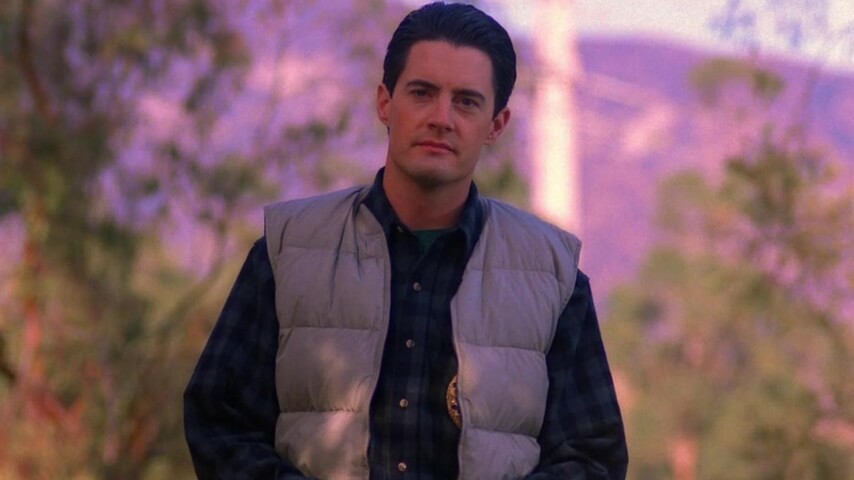Twin Peaks recap: season 1, episodes 2 and 3
This TV Club Classic delves into "Traces To Nowhere" and "Zen, Or The Skill To Catch A Killer."
Photo: ABC
Episode 2
Four days after ABC premiered the Twin Peaks pilot it aired the first proper episode, an hour nearly as peculiar as its predecessor. Anyone unsure whether they were watching a comedy or tragedy was no doubt further disoriented by an opening scene that found Agent Cooper hanging upside-down, dictating another note to “Diane” and adding a further thought that asked, “What really went on between Marilyn Monroe and the Kennedys and who really pulled the trigger on JFK?” McLachlan delivers the line as if the notion that the official story about the Kennedy assassination might have some holes in it had never occurred to Cooper before. Maybe Twin Peaks has shaken some skepticism loose in that boy-scout brain of his.
Also apparently shaking something loose: Audrey, who makes no attempt to hide her infatuation for Special Agent Cooper, even if he does little to reciprocate. I love the sweetness of that relationship. Audrey wants to be a bad girl, but the moment a man treats her with the kindness her dad seems incapable of providing she wants nothing more than to do the right thing. “Emotional problems” may run in her family, but her issues seem pretty simple. I also love that her acts of rebellion, at least those we’ve seen so far, wouldn’t be shocking in 1952. In a later scene in which her dad chastises her for playing her weird jazz music too loud, music that sounds an awfully lot like Angelo Badalementi’s score. (It’s a neat instance of the elements that make up the show bleeding into the show itself and we’ll see it again later when Audrey plays a song at the diner.) On the other hand, I’d never before noticed that Audrey does seem a little stoned most of the time.
But it’s not all laughs this hour, even with the mysterious fish-in-the-percolator moment, an apparent miracle I don’t believe the show ever really explains. (Did Pete get confused? Did Catherine drop it in out of spite? Did it just kind of happen, as things do in Twin Peaks?) As Cooper and Sheriff Truman further their investigation into Laura Palmer’s death, we get to know the locals more. The show virtually points the finger at Leo Johnson (Eric Da Re) as he worries over a bloody shirt and proves himself capable of abusing women. His bar-of-soap-in-a-sock beating of Shelly (Madchen Amick) ranks among the show’s most disturbing moments. (I also always associate with the moment in The Grifters, a movie I saw around the same time, when Pat Hingle drops some oranges in a towel with the promise that “you’ll never shit right again.”)
The episode ends on a somber note as well. Dr. Jacoby is revealed as the man with the other half of the locket and begins crying has he listens to the final tape he received from Laura. We don’t get to hear what she says but the tears on his face remind us of how much the town has lost with Laura’s murder, even when it’s people who had no business taking so deep an interest in a teenage girl who feeling the loss.
Episode firsts:
• Jacques Renault’s name gets dropped for the first time
• As does Albert Rosenfeld’s, who we’ll see in Episode Two
• We first hear about the Bookhouse Boys, even if we don’t know what they do.
• We first find out that Ben Horne and Catherine Martell are an item
• “Bob” makes his debut appearance, not counting the alternate version of the pilot.(More on that below.)
• This is, I believe, the first reference to Horne’s Department Store
• This is also the first time we learn the extent of Dr. Jacoby’s Hawaii fixation. He was wearing a Hawaiian themed shirt in the pilot but we had no sign of how deep the identification went.
Grade: A-
Episode 3
Here we have one of the most peculiar hours of television ever to air on a network. (And I say that as someone who’s seen the shown-once-only Far Side Halloween special.) Even the minor details are peculiar. Shortly before meeting the acerbic Albert Rosenfeld (the terrific Miguel Ferrer), Cooper briefs Truman on his unique character then concludes the chat by playfully grabbing Truman’s nose. What is this? What kind of show are we watching?
Peaks is at its best when it refuses to answer that question but even when it settles into being a soap opera, the genre gives it some freedom. Peaks episodes tend to be short on arcs and discernible acts. As a soap it doesn’t have to worry about such things so long as it keeps the plates spinning. The show tends to go to commercial break on a suspenseful note but mostly the episodes just kind of unwind. There’s another structure at work, too. I’d never noticed before this pass how tight the continuity is, at least initially. Episodes tend to capture a period of about 24 hours in the life of the town and there’s a lot of attention paid to keeping the chronology straight.
 Keep scrolling for more great stories.
Keep scrolling for more great stories.
